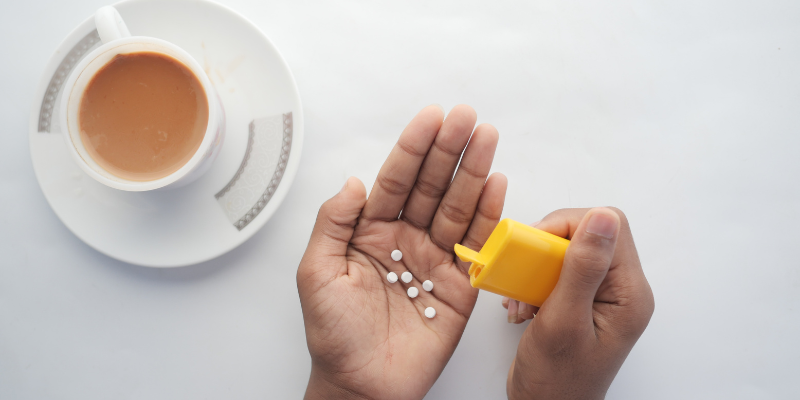- WhatsApp: +923249502250
- Email: info@pharmacologymadeeasy.com
The Impact of Artificial Sweeteners and the Importance of Resetting Taste Preferences



In today's world, the consumption of sugary beverages and their diet equivalents is a common occurrence. However, the impact of these drinks on our health is a subject of ongoing debate and research. Recent data suggests that when conducting clinical trials involving children or overweight adults, there is no significant difference in weight, diabetes risk, or other metabolic parameters when comparing the intake of sugary drinks to their diet counterparts over a six-month period. This finding raises questions about the true benefits of swapping sugar-laden beverages for diet versions, aside from potential dental health advantages.
The Paradox of Caloric Intake
Consider this: the average can of sugary soda contains approximately 150 calories. Consuming two cans a day equates to a reduction of 300 calories if replaced with diet sodas. According to the calories in, calories out theory, this should result in weight loss. Yet, many individuals do not experience significant weight changes, suggesting that other metabolic factors might be at play.
Metabolic Mysteries
One hypothesis is that artificial sweeteners might reset the brain's response to sweetness at a neural level, affecting insulin in ways we do not yet fully understand. Personal experiments with glucose monitors have shown unexpected sugar and insulin peaks even with artificial sweeteners, indicating a complex metabolic interaction. .
Another theory is that these sweeteners could be affecting our gut microbes. Derived from substances such as petrol and paraffin, these chemicals may produce unusual reactions in the body, potentially interfering with metabolism and leading to weight gain or a predisposition to diabetes, similar to sugar.
The Role of Individual Variation
It's crucial to recognize that individuals may react differently to various artificial sweeteners. While some people might tolerate certain sweeteners without adverse effects, others may experience negative reactions. This individual variability underscores the need for a nuanced approach to sweetener consumption.
Rethinking Sweetness
The notion of reducing sugar intake by flooding diets with artificial sweeteners needs reconsideration. These sweeteners, a byproduct of sugar levies, may inadvertently encourage a preference for ultra-sweetened products, especially among children, leading them to crave sugar and avoid sour foods, which can be beneficial to their health.
There is optimism surrounding natural alternatives like Stevia, yet the broader implications of creating artificial flavors that satisfy sweet cravings remain uncertain. It's essential to teach both children and adults to appreciate less sweetened beverages such as water, teas, and herbal infusions, rather than relying on sugar-laden or artificially sweetened drinks.
The Decline of Water Consumption
Alarmingly, many children today exhibit a reluctance to drink water, a fundamental necessity for survival throughout human history. This aversion to water may be a result of societal conditioning and the proliferation of alternative beverage choices.
The Water Conundrum
The perception that tap water is unpalatable or unsafe has contributed to the rise of bottled water, often processed from tap water with added flavorings to make it more appealing to children. This trend further distances young taste buds from appreciating the natural flavors of water.
Resetting children's taste preferences away from excessive sweetness is crucial. If children become accustomed to super-sweet flavors, they may struggle to appreciate the natural sweetness found in fruits or the flavors of vegetables.
The concept of resetting the "taste thermostat" is vital. A century ago, the natural sweetness of a ripe peach was a cherished treat. Today, with the prevalence of highly sweetened snacks, such natural flavors may no longer captivate the palate as they once did.
The Impact of Sugar and Artificial Sweeteners
The widespread use of sugar and artificial sweeteners has led to a narrowing of taste preferences. Fruits and other foods are often bred for excessive sweetness, diminishing the variety of flavors that once included a balance of sweet and sour.
This shift in taste preferences has consequences for dietary diversity and the ability to enjoy a broad range of foods, including vegetables. As children are raised on a diet dominated by sweetness, their ability to appreciate other flavors diminishes.
Conclusion: A Call to Action
To address these challenges, it's essential to encourage a return to more natural and varied taste experiences. By promoting the consumption of water and less sweetened beverages, we can help reset taste preferences and foster a healthier relationship with food and drink.

CUSTOMER SUPPORT DESK
Need help with something?
WhatsApp & Helpline:
+923249502250
info@pharmacologymadeeasy.com
support@pharmacologymadeeasy.com
FOLLOW ON SOCIAL MEDIA
About Me
I’m Prof. Dr. Abdul Qudoos. I provide online consultations for patients located worldwide, along with Pharmacology video lectures and notes for medical students across Pakistan. Whether you need medical guidance or academic support, I'm here to help!

Dr. Abdul Qudoos
MD, MPhil, CHPE, FCPS-II Trainee
Quick Links
Legal Policies
- © Pharmacology Made Easy. All rights reserved.
